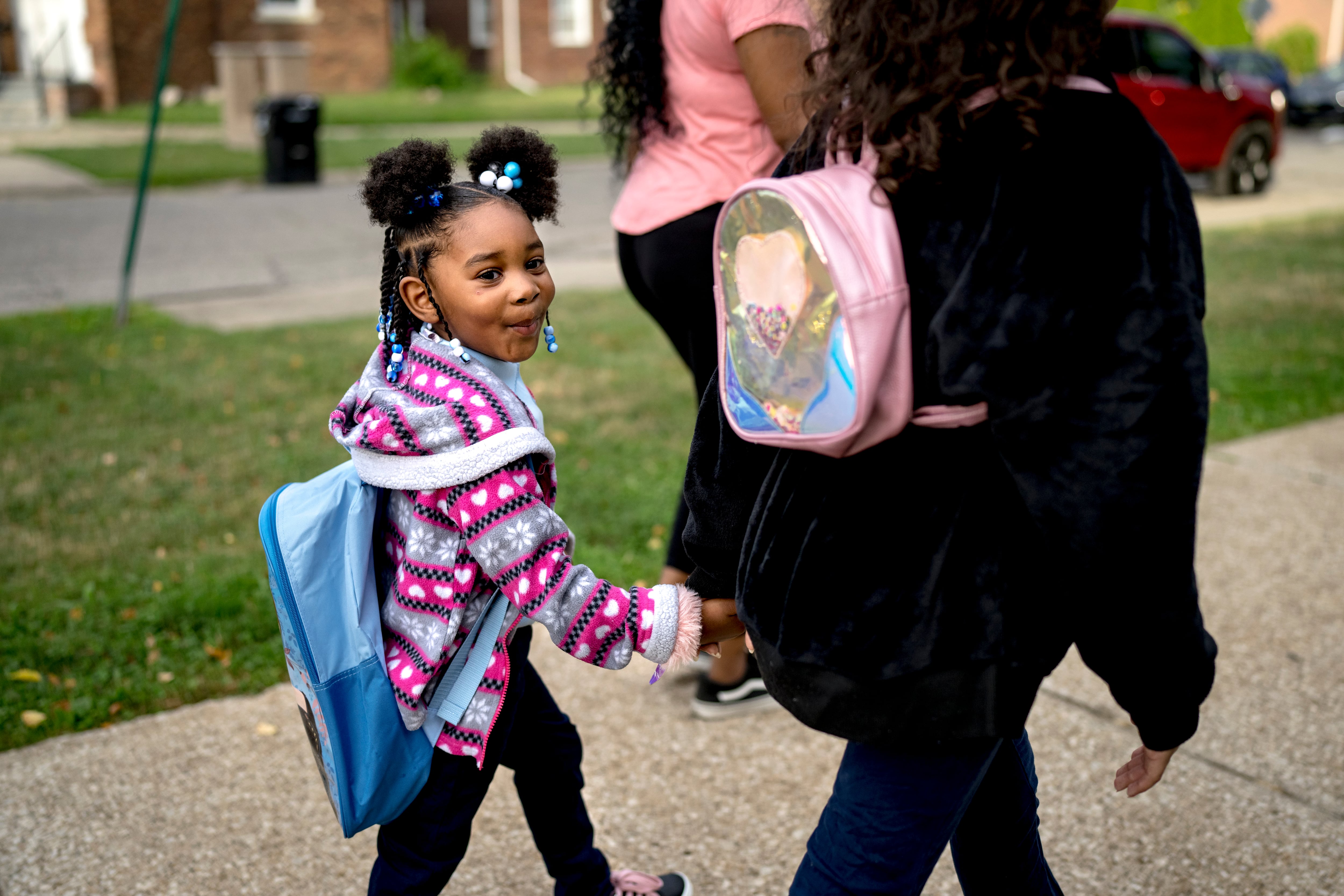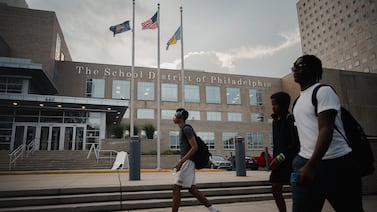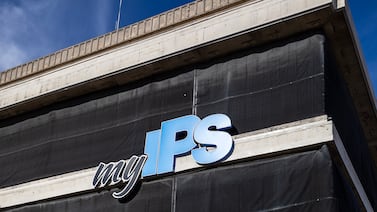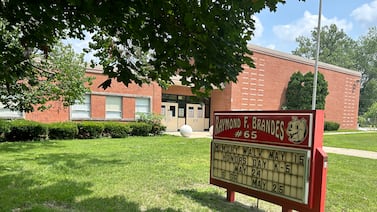Sign up for Chalkbeat Detroit’s free newsletter to keep up with the city’s public school system and Michigan education policy.
Monday is the first day of school in the Detroit Public Schools Community District and many others across Michigan, but educators face uncertainty about how schools will be funded.
Michigan lawmakers have yet to agree on a budget that will determine how much money schools will receive. The delayed budget is one of many issues Chalkbeat will be keeping an eye on during the 2025-26 school year.
DPSCD also is starting a pilot program that will provide yellow school bus transportation to students at two high schools in a bid to improve attendance and reduce chronic absenteeism. The Trump administration’s actions, including cuts to federal funding, could affect Michigan schools. And we’re interested in whether a change in leadership at the Michigan Department of Education and a governor’s race will elevate the conversation about improving Michigan schools.
Here’s more on what we’re watching.
Budget stalemate leave school districts in limbo
Free school meals for all Michigan children is a potential casualty of a budget stalemate that has lasted for months.
July 1 was the deadline for the Michigan Legislature to adopt a state budget. Lawmakers have blown that deadline and don’t appear close to resolving it. Blame is flowing between Democrats and Republicans, each blaming the other for the delay. Meanwhile, school leaders who had to adopt budgets by June 30 are left to wonder if they’ll have to lay off staff if the state budget, when it’s finally adopted, doesn’t align with their spending plans.
It’s not the first time the school year has begun without a state budget, but in years past when this has happened, there weren’t major differences between the House and Senate. This year, though, the Republican-controlled House budget makes substantial changes to how schools are funded. Instead of a separate line item funding the free school meals, the House budget creates a separate funding stream from which local districts can choose to pay for a number of items, including meals. The Democratic-controlled Senate maintains dedicated funding for free school meals.
“I don’t ever recall in my career so little clarity about approximately where school funding in the annual budget will land. It is troubling and, if not rectified very soon with the passage of a reasonable budget for schools, will ultimately hurt children,” State Superintendent Michael Rice said at a recent State Board of Education meeting.
As far as the school meals are concerned, state funding runs out Sept. 30. Districts are being urged to continue providing the free meals at least until that date. But if the date comes and goes and there is still no budget, or no explicit funding for the meals, it could result in some students going hungry.
Education a key issue in Detroit mayoral election
Detroiters on Nov. 4 will decide who will be the next mayor of Detroit. Mary Sheffield, the president of the city council; and Solomon Kinloch, the senior pastor at Triumph Church in Detroit, were the top vote-getters in the primary held earlier this month.
Both cited the need for the city of Detroit to play a stronger role in education in the city, particularly as it relates to fighting chronic absenteeism. Whoever is elected will take over from Mike Duggan, who has been mayor for more than a decade.
The desire to get involved in education issues is happening at a critical moment in the city. Low academic achievement and high rates of chronic absenteeism are among the biggest challenges schools face. But contributing factors such as poverty, housing instability, transportation, and safety concerns — issues schools alone can’t resolve — impede school success for many students.
Sheffield said in a response to a Chalkbeat survey that her role would “be a solutions-oriented advocate on behalf of parents, teachers, students and community members.” She said she would “commit significant resources” toward improving conditions that affect education that the city oversees.That includes Infrastructure, quality of life for students and families, safety, and funding advocacy.
Kinloch, on his website, said he will appoint a senior cabinet level position on education and that person would be “specifically tasked with working with our school administrators, educators, parents, and children to coordinate city services that support student success.”
How to address troubling academic performance for Michigan students
There are many reasons to believe improving Michigan schools is a top priority at the state level. But the selection of a new state superintendent and a governor’s race where education is expected to be a key issue, should fuel discussion.
Student performance on state and national exams has been troubling. On the National Assessment of Educational Progress, or NAEP, just 24% of fourth graders were considered proficient in literacy, and 31 states scored higher in fourth grade reading than Michigan. Results are similarly lackluster for the other grades and subjects tested, as well as on the state’s Michigan Student Test of Educational Progress.
Candidates hoping to become Michigan’s next state superintendent, a process that will continue Aug. 26 with the interviews of three finalists, all cited literacy as a key priority in improving school performance.
On the campaign trail, some of the candidates vying to become Michigan’s next governor identified improving schools as a key issue, with Detroit Mayor Mike Duggan releasing his education plan earlier this year.
The big question we’ll be seeking answers to is what can be done to help students succeed academically. Michigan has tried many reforms, but few have stuck for an extended period of time. Some have been abandoned completely.
How Trump administration affects education
School district leaders also must contend with the uncertainty about how the Trump administration’s actions will affect schools.
Massive layoffs at the U.S. Department of Education has meant Michigan parents who filed federal civil rights complaints against their local districts are in limbo waiting to hear if and when their cases will be held — and if their children with disabilities will get the services they need to succeed.
Stepped up immigration crackdowns have been felt in Detroit and will likely continue to be an issue throughout the 2025-26 school year. Near the end of the last school year, Detroit teen Maykol Bogoya-Duarte was detained while on his way to a field trip. He had been working toward citizenship and was just three credits shy of earning a high school diploma. He was deported to his native Colombia in June.
The budget bill Congress passed last month cuts Medicaid spending, affecting districts that rely on Medicaid reimbursements to provide services to some students. And it’s unclear whether the Trump administration will attempt to cut key federal funds, particularly after the government froze — but eventually released — more than $6 billion in school funding.
Yellow school buses for some Detroit high school students
In DPSCD, a pilot program might answer questions about whether providing yellow school bus transportation to high school students could help combat chronic absenteeism.
It’s the district’s latest effort to address its attendance issues, and it involves offering bus transportation to students at Henry Ford High School and East English Village Preparatory Academy at Finney.
DPSCD currently doesn’t offer yellow bus transportation for most high school students. Transportation concerns are among the factors that have resulted in the district having a 60% rate of chronic absenteeism, well above the state average of 30%.
Chronic absenteeism is a problem in many school districts across the state, and it affects student performance. It’s an issue Chalkbeat Detroit has covered extensively since 2022, and we will continue to make it a priority.
Some Detroit students with disabilities move to a different school
Big changes are coming to DPSCD’s special education programs.
In the fall, the district will increase the number of self-contained classrooms, where students with disabilities receive instruction from a special education teacher for most of the day, from 174 to 185 classrooms. Self-contained classes are designed for students to get the services they need while still attending general education schools.
However, services will be offered in fewer schools, going from 60 to 38. Some students will have to transfer to one of the new sites that offers a program specifically for their disability.
The restructuring is happening to ensure every special education classroom is fully staffed with teachers and support staff. And it reduces travel time for families by offering programs in their high school feeder pattern — the school they would be assigned to based on where they live, Superintendent Nikolai Vitti said at a June school board meeting.
Lori Higgins is the bureau chief for Chalkbeat Detroit. You can reach her at lhiggins@chalkbeat.org.






